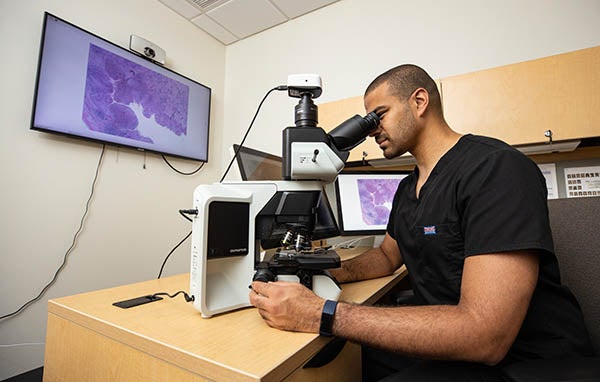ECU medical, dental schools partner to improve telehealth access
Faculty in East Carolina University’s Division of Health Sciences are collaborating on grant-funded efforts to enhance connectivity for home-based telehealth primary care access for patients in rural eastern North Carolina counties.

Faculty in ECU’s Division of Health Sciences earned a grant to help improve access to telehealth for patients in rural eastern North Carolina. (Photo by Cliff Hollis)
The project titled, “Consortium for Home-based Telehealth” is being led by faculty in ECU’s Brody School of Medicine and the ECU School of Dental Medicine. The project is supported by a grant from the Health and Human Services Administration (HRSA) in the U.S. Department of Health and Human Services for $350,000 per year, for five years for a total of $1.75 million.
The project aims to help increase patient opportunities for telehealth care by leveraging broadband and cellular access for telehealth in the targeted rural communities and examining specific barriers and facilitators to home-based telehealth services.
“This project is about better understanding the value and effectiveness of delivering selected components of a patient’s medical and dental care in the home, using telehealth-enabled technology and to really evaluate how that works,” said Dr. Doyle “Skip” Cummings, project co-director and professor in Brody’s Departments of Family Medicine and Public Health. “The grant is also about evaluating how we can use telehealth to keep people healthy and mitigate disease.”
The project will focus on the eastern North Carolina counties of Beaufort, Bertie, Hertford, Duplin, Martin, Northampton and Pasquotank. The grant team is using a forward-thinking approach in beginning such a large-scale project and anticipating the challenges that come with it. In Hertford County, for example, an estimated 40% of households do not have broadband internet.
“That’s a big challenge right off the bat,” Cummings said, adding that the project has the potential to provide information in areas where the federal government lacks data. “There’s a fair amount of evidence on how telehealth is helpful in emergency rooms and office/dental practices, but there’s not much evidence when you go into the home setting in rural areas. That’s why the government really wants to see projects like this implemented.”
The project’s goals are to provide selected aspects of acute and chronic primary medical care, dental evaluation and referral, behavioral health, nutrition and pharmacy counseling, and chronic disease management via telehealth into the home setting. The expected outcome is that increased access to telehealth care will improve access to both local and regional providers, save costs and produce clinical measures comparable to face-to-face care.

The HRSA grant is led by a team from the Brody School of Medicine and the School of Dental Medicine, including Dr. Andres Flores, whose expertise includes teledentistry. (Photo by Rhett Butler)
The team’s leaders also include Dr. Andres Flores, project co-director and division director of oral and maxillofacial pathology in the ECU School of Dental Medicine; Jill Jennings, clinical nutrition specialist in Brody’s Department of Family Medicine and manager of the Healthier Lives at School and Beyond school-based telehealth program; and Hannah Barnett, research associate, and includes support from Dr. Audy Whitman, Rural Residency program director in Brody’s Department of Family Medicine.
Flores works closely with faculty across the dental school’s network of community service learning centers, consulting on patient cases and using teledentistry to make those connections more quickly and efficiently. He brings that expertise to the project and is eager to put it into action.
“We’re hoping to help patients become more familiar with the technology that already exists that now we can apply in this way,” Flores said. “From a patient perspective, the benefit is tremendous and involves people from a variety of disciplines trying to reach out to rural communities to achieve results.”
The project comes at a timely point. The COVID-19 pandemic has revealed the need and opportunity for more widespread telehealth applications, including expanded use in patients’ homes. Rural areas have lagged behind urban areas, and minority and disadvantaged populations have had more limited access to the technology needed for telehealth visits.
“We’re all working toward the same goal: to enhance patients’ lives,” Jennings said. “That’s what drives us all.”
Barnett said applying what she’s learned about public and community health is an experience that will enrich her own knowledge base.
“I’ve spent years, as a student at ECU, learning about the community around us and how to serve,” she said. “Now I actually get to do it, and that is an awesome opportunity.”
The grant team will work with community partners including the Roanoke-Chowan Community Health Center (RCCHC), a federally qualified health center with a history of partnering with ECU on health initiatives, including alongside the dental school’s community service learning center in Ahoskie and the Rural Family Medicine Residency Program out of Brody and Vidant Health. RCCHC’s chief medical officer and rural residency program leader, Dr. Geniene Jones, is a graduate of the Brody/Vidant Family Medicine residency program and will assist with program implementation.
“We were careful in picking partners that want the same things we want,” Cummings said. “All of us have a passion for reaching out and caring for folks in our region that don’t have the same opportunities that we have here in Greenville. We’re privileged to have these resources from grants, and together, we have the mindset and desire to help people in our communities.”